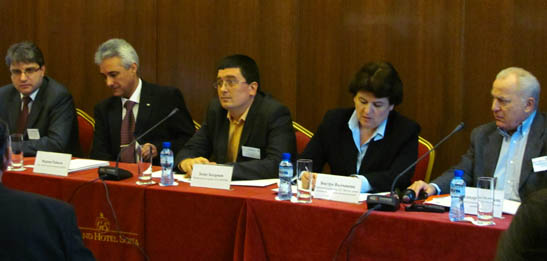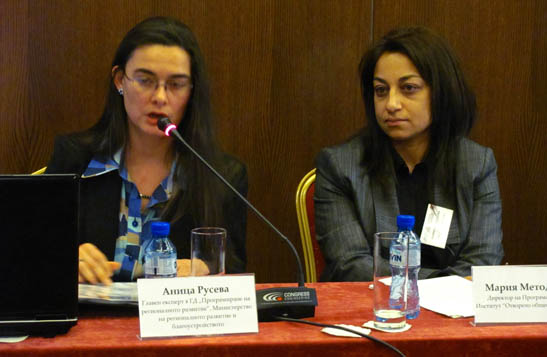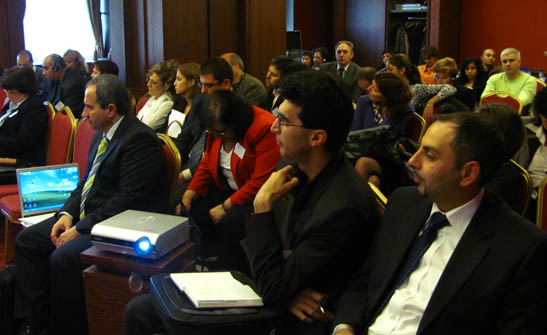06.12.2009National forum “The Structural funds and the Roma integration” took place in Sofia
How the absorption of EU funds could support the process of Roma integration was the main topic of the national forum “Structural funds and Roma integration”. The forum took place in
of Roma integration was the main topic of the national forum “Structural funds and Roma integration”. The forum took place in
 The program of Bulgarian government pays special attention to the integration and improving the economic and social status of Roma, said in its opening remarks Deputy Minister of Foreign Affairs Marin Raykov. He stressed that the government undertakes efforts for active participation in the international initiative Decade of Roma Inclusion and for implementation of the strategic documents approved – the Framework Program for Roma Integration, etc. Deputy Minister Raykov explained also that the government will strengthen the control over the efficient and effective implementation of European funded projects, including those that target Roma. He stated that there were many possibilities for financing Roma related projects that had not been used until that moment and promised to support all recommendations of the forum that would bind structural funds absorption with Roma integration.
The program of Bulgarian government pays special attention to the integration and improving the economic and social status of Roma, said in its opening remarks Deputy Minister of Foreign Affairs Marin Raykov. He stressed that the government undertakes efforts for active participation in the international initiative Decade of Roma Inclusion and for implementation of the strategic documents approved – the Framework Program for Roma Integration, etc. Deputy Minister Raykov explained also that the government will strengthen the control over the efficient and effective implementation of European funded projects, including those that target Roma. He stated that there were many possibilities for financing Roma related projects that had not been used until that moment and promised to support all recommendations of the forum that would bind structural funds absorption with Roma integration.
Roma integration is one of the main challenges faced by European Commission and the Commission is in the process of establishing its Roma policy that would be applied by every member state with respect to the national peculiarities, explained Bistra Valchanova from DG “Employment, Equal Opportunities and Anti-Discrimination” of the European Commission. Fostering Roma integration is of crucial importance – it is of interest of the entire society. 
Alexandros Tsolakis from DG “Regional Development” of the European Commission assured the participants that the Commission took strong engagement to build European Roma Strategy and encourages Roma targeted actions. The door for Roma targeted activities is open and we should open it more and more. Roma should be at the top agenda of the European Commission: we could not let the desperate situation of Roma continue, stressed Mr. Tsolakis.
The National Coordinator of the Decade of Roma Inclusion Milen Milanov also congratulated the participants. Structural funds are not end in itself but tool for improving the situation of Roma and for financing Roma integration activities, said Mr. Milanov. The partnership between institutions and Roma NGOs is of crucial importance: it conveyed brilliant results during the preparation of the operational programs and should continue.
George Stoychev, Executive director of Open Society Institute – Sofia provided data from a recent survey showing that Roma are the group most affected by the economic crises. That is why structural funds should be spent for Roma and PLATFORM project of OSI and Amalipe is a good example in this direction: it provides free consultative help for preparing projects for Roma integration.
This meeting is not the first one, stated in his opening speech Deyan Kolev, Chairman of Center Amalipe. In 2006 and 2007 when the operational programs we prepared Amalipe and OSI organized two similar meetings followed by advocacy campaign before Bulgarian and European institutions. Tens of Roma NGOs joint our efforts and we achieved strong success regarding the National Strategic Reference Framework and Human Resources Development Operational Program. It is time to extend this success to Regional Development OP and Rural Areas Development Program: they also have crucial importance for Roma integration. Deyan Kolev stressed also that two DGs of the European Commission sent special representatives to take part in the forum, high level political figures and officials from the Managing Authorities of three important for Roma integration Programs are also present: this is a clear sign for serious engagement by the side of European Commission and Bulgarian institutions. This is also a certain precondition for achieving concrete visible results.
The advance of Human Resources Development OP, Regional Development OP and Rural Areas Development Program was discussed during the plenary sessions: did they “touch” the Roma community and what should be changed (in their design and implementation) to support more actively Roma integration. Presentations from the Managing Authorities, European Commission and NGO experts were delivered for every of the three Programs. Despite different interpretations of some facts, all speakers agreed on certain common ideas. One of them concerned Roma targeted operations: they foster Roma integration and should be included in every Program (at present only HRD OP contains Roma targeted operations); calls for proposals within these operations should be regularly opened. Multisectoral interventions that include education, employment and social services are necessary for fostering Roma integration and the administrative barriers before such activities should be removed. Simplification of the procedures and shortening the time for intermediate payment was another topic of agreement. The necessity of accurate data collection for evidence based policy regarding Roma also brought agreement among all speakers. They proposed certain recommendations for imp[lamenting this ideas.
The intervention of Adam Kullmann, former Director of the Program for targeted actions in disadvantaged regions in








